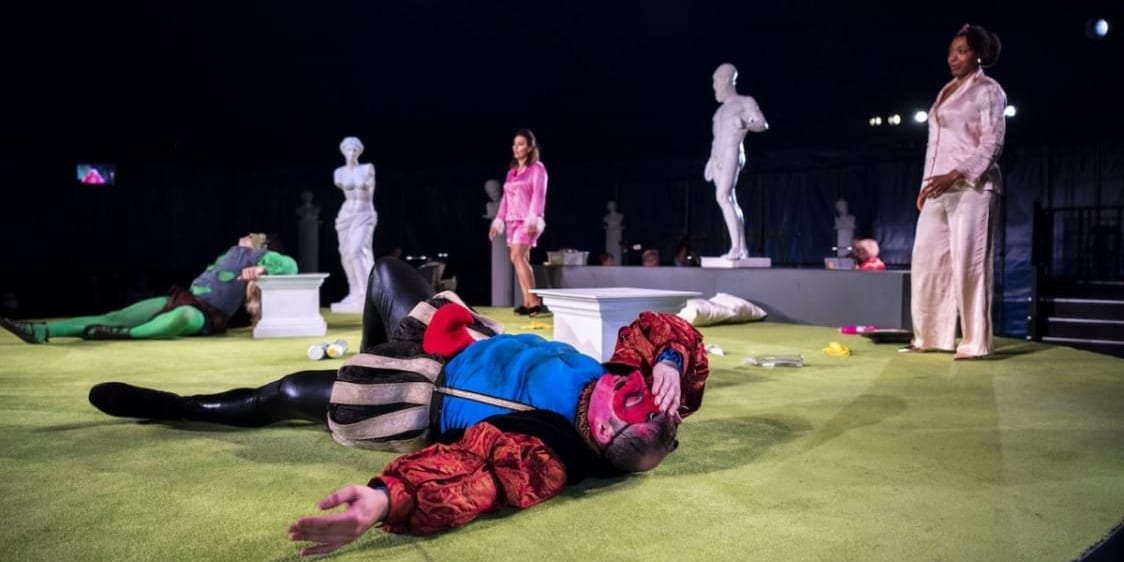Women are Human at Longborough
Because of the pandemic, the Longborough Opera Festival has come up with an
ingenious solution to allow them to have a socially distanced and masked plus
properly ventilated season – the construction of an opera tent, a red Big Top!
Organized and laid out so that the playing is “in the round” and the audience
members are socially distanced, as well as having entranceways that are kept
open or ventilation, the first offering of the summer (after doing Wagner in the
regular theatre with about 1/3 of the usual audience) is an unusual
and ultimately charming version of Cosi Fan Tutte.
The “given” is that the orchestra is The Barefoot Band led by its founder, the clever Lesley Anne
Sammons. Sammons has re-orchestrated Mozart for this show. Now, there are
several good reasons given for this: making the opera more funky, more modern,
move appealing to a contemporary audience; clearing away the cobwebs of a
too-familiar classical work and making it feel more as it must have felt for the
original audience in 1792. In a clever production by director Sam Brown with a
modern setting created by designer Naomi Kuyck Cohen – and without a chorus
– this is a production that could easily tour to small venues and bring the opera
to places that it usually does not reach. On balance, it is a success.
When the opera started I thought we were in for a totally delightful time. However, once I
had heard the first ten minutes or so, the use of this band and unusual
orchestration had made its point, I felt, and it did not then seem to develop
further or take on extra dimensions. There are certainly delightful
moments of unusual sonorities that perk up your ears all the way through. But
for me, somehow, the overall concept of Mozart played by a kind of Klezmer
band ultimately did not gel.
I still think it was an interesting experiment, not at all off-putting, and a delightful Cosi in most other ways. The productions as such was clever – I liked the staging, the statues, I liked the balloons, and above all I
enjoyed seeing an opera “in the round” as if on the stage at Chichester. I found
myself hoping that Longborough will find ways of using the tent in the future
even after Covid – perhaps for experimental operas, perhaps as a venue that
could give more opportunities to up-and-coming new singers, directors, designers and musicians.
The chief delight of the evening came from the singers, who were also young and
lively actors. The women were simply brilliant – both vocally and dramatically.
The interpretation of the characters also worked and was thought provoking.
Anna Patalong managed to convey to journey of Fiordiligi from a young, naïve
and perhaps somewhat shallow young woman in love with love to someone
tormented and confused by her unexpected feelings. Her coloratura was a
pleasure; as was the rich, moving and strong voice of Idunna Münch as her sister,
Dorabella, portrayed as a much shallower character from the start. The voices of the two women were well contrasted. Lizzie Holmes was the fine and memorably well-sung and energetically well-acted Despina, especially delightful in the comic
scenes disguised as the doctor and the judge. Her judge, in fact – an attractive
and sexy woman, since these are modern times – was so different visually from
her Despina “look” that you could almost believe that she could have got away
with it.
The men, Marcus Farnsworth as a rough and ready (his character, not his
fine voice) Guglielmo and William Morgan as a mellifluous and rather sweet-
natured Ferrando, were totally believable. Their confusions and their covert
misogyny were well portrayed. But above all John Molloy as Don Alfonso
dominated the male side as he should – manipulative , clever, a bit sinister;
possibly merely mischievous or maybe trying to teach an important lesson to the
youngsters. Molloy sang with a very rich, strong and impressive voice. I would
happily hear him in any bass-baritone role he would be asked to do.
So for me not quite as fully accomplished a production of the opera as I was
hoping; and I certainly have my questions about the value of the experiment with
a re-orchestration (despite particularly enjoying the accordion, recorders and
especially good percussion) – though I do not object at all to its having been
done. Also I have to praise the translation. The opera was sung in very clear English – and
there were helpful surtitles. The rendering of the libretto into English
by Amanda Holden was witty, apt and illuminating. It was a sensitive homage to
the original words by Lorenza da Pont and also a kind of on-going gloss on the
meanings and subtext. Even the rendering of the title as Women are Human was
a fitting phrase for the sense of the Italian title. This translation interpreted
subtext as well as text and therefore kept one’s attention throughout.
It was a fine evening’s entertainment even if I was not totally convinced by the need for a new orchestration.

